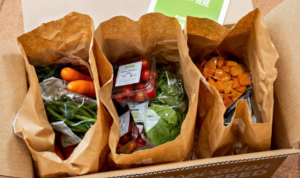Visitors from outside the EU who have made purchases within the EU can reclaim the VAT they paid when they leave the EU again.
The process of reclaiming seems complicated, causing many tourists to miss out.
Swiss company Global Blue facilitates VAT reclaim by acting as an intermediary between consumers, retailers, customs and tax authorities.
Results suffered greatly from corona when travel was down.
Sales have since recovered, but not yet the stock price.
Management is initiating new, high-value fintech activities and has the backing of reputable investors including Alibaba and Tencent.
Global Blue is not a small player but it does have a small price, which is grist for the mill of Equity Underperformers.
Wall Street has little attention because its marketability is low.
Deutsche Bank investigated the company and came up with a price target of $8 in September, which was lowered to $7 in November.
Investors do not seem to see that Global Blue has put the covid period behind it and that its weak balance sheet will soon improve.
We are therefore including 500 shares of Global Blue Group Holding AG in the portfolio of SharesUnion at the current price of $4.50.

Incorporation to IPO
The company’s roots lie in the Swedish port city of Trelleborg, where wayward entrepreneur Alf Näslund tried all sorts of things to attract tourists. For example, he had a local coin minted with Trelleborg scenes, for which he had to go to the Riksbank. He also had a park built with freeze-resistant palm trees, where the annual Palm Festival is still held. He had the most success with his company Trelleborg Tax Free Shopping, which helped customers reclaim VAT. Because of its success, he expanded to other European countries and changed the company’s name to Europe Tax Free Shopping. In 1999, the first private equity investors got on board, and global expansion began. In 2001, the company, now called Global Refund, moved to Switzerland, where it began facilitating currency transactions. In 2012, the company came into the hands of Silverlake, another private equity investor, and Swiss tech investor Partners Group stepped on board. Veteran Per Stettenberg had to step down after 25 years for new top executive Jacques Stern, who changed the name to Global Blue Holding AG. After the initial lockdown, Silverlake felt the time was right for the IPO, which took place in August 2020.
IPO
Global Blue merged with Far Point Acquisition Corporation, a spac sponsored by a consortium of Thomas Farley, the former president of the New York Stock Exchange, on the one hand, and Third Point Capital, the hedge fund of investor Daniel Loeb, on the other. The IPO value came to $2.6 billion, double what Silverlake had put down in 2012. One of the new investors who climbed on board was Ant Group, Alibaba’s fintech subsidiary. Last year, Alibaba’s rival Tencent bought 18 million shares for $5.5, half of which came from Silverlake, which now owns 67% of the shares. Tencent is the second shareholder with over 9%, Ant group is third, while Thomas Farley and Partner Group both own just under 2%.
Current business
Its operations are divided into three divisions: Tax Free Shopping Services (TFSS), Added Value Payments Solutions (AVPS) and Retail Tech Solutions (RTS).
- TFSS is by far the most important division, contributing €229 million and accounting for 70% of group revenue. The division applies a 30% rate on recovered VAT. Relationships with some clients go back more than 20 years and earlier this fiscal year brought in Bottega Veneta, Audemars Piguet, Lacoste and Karl Lagerfeld. More than 80% of sales come from Europe and the remainder from Asia, while the first steps have been made in Latin America. Most sales come from American, Russian and especially Chinese tourists buying luxury goods in EU countries.
- The most important part of AVPS is Dynamic Currency Conversion (DCC). In stores and restaurants with DCC, foreign tourists can automatically pay in their own currency. It is widely used at tourist attractions and airports. Turnover last year was €62 million with which the division supplied 20% of group sales.
- RTS is made up of a number of fintech acquisitions active in e-commerce and omnichannel distribution. These include exclusive delivery, return delivery and digital receipts. The new division’s revenue contribution is only 6% but grew 65% last year, 39% of which came organically. RTS has a collection of majority interests that could be acquired thanks to its partnership with CK Opportunities Fund. As part of the partnership agreement, the fund invested $180 million in preferred shares of Global Blue and $45 million in common stock. The preferred shares provide a 5% cumulative dividend and are convertible into 21 million common shares. If CK Opportunities were to convert, it would become the second shareholder with a 13% stake.
On the board, in addition to representatives from Alibaba, Silverlake and Partners Group, we found the aforementioned Thomas Farley and Eric Meurice, the Frenchman we remember from his time at ASML.
They are based in the town of Nyon on Lake Geneva, from where 1,800 employees in 40 countries are managed.
The company serves more than 300,0000 stores, hotels, restaurants and banks.
Results development

The bar chart above shows the impact of the lockdowns well. The broken fiscal years end March 31 so the results for the first six months of the current fiscal year (FY2023/2024) were announced in November. Revenue grew by 50% and adjusted EBITDA by 130%, although growth weakened somewhat in the last few months. The multi-year results table below shows that ebitda for FY2022/2023 was already positive again and for the last four quarters to October 2023 (TTM, trailing twelve months) net profit was also positive again.

Strategy
Management used the covid period to improve internal processes. Over 40% of tourists who could reclaim VAT find the process too laborious or are not well informed about the possibilities. The processes were further digitized, making the process less labor-intensive and cheaper. By covid, the risks of the high dependence on tourists became painfully clear. Therefore, the strategy is now focused on diversification in a way that connects with already existing customer relationships. Among the results of that strategy are the expanded e-commerce service offerings in the AVPS division and the fintech acquisitions of RTS. Management expects long-term revenue growth to average 8% to 12%, with EBITDA margins rising to 50%.
Balance
In August 2020, the cash position was well stocked by the IPO, but then the lockdowns have left a sizable hole, leaving S&P’s credit rating no more than a meager B+. In September, the company had €729 million in long-term debt, of which, after deducting the cash position, a net debt position of €568 million remained. Due to cash flow recovery and Tencent’s investment, net debt is now more than $100 million lower than it was in March 2023, which is also necessary as annual interest expenses rose toward €50 million due to higher interest rates. In November, a €610 million loan was taken out for seven years at euribor plus 5%, which is now effectively over 8%.
The ratio of net debt to ebitda must return to 2.5x, which is projected to be achieved by March 2025.
For fiscal year 2023/2024, management expects to achieve adjusted ebitda of €125 – €145 million and for fiscal year 2024/2025 more than €200 million.
Thus, net debt only needs to fall €62 million to meet the target, which can easily be achieved from free cash flow.
Rating
At the current share price, the enterprise value is $1.65 billion, implying that the ev/ebitda ratio for next year maxes out at around 8x, which is cheap for a stable quality company with good prospects. That the stock is too cheap at $4.25 is also evidenced by the fact that Tencent was recently willing to pay $5.50 for it. The market capitalization of $1.04 billion is not only much lower than the $2.6 billion at the time of the 2020 IPO, but is also lower than the $1.3 billion that Silverlake plunked down in 2012. Another private equity investor recently paid €1.8 billion for its much smaller competitor Planet Payment, even though that company generated revenues of only $50 million in 2019.
Conclusion
Global Blue is not a small player, yet Wall Street has paid little attention because its marketability is low.
Only Deutsche Bank investigated the company and came up with a price target of $8 in September, which was lowered to $7 in November.
Investors do not seem to see that Global Blue has put the covid period behind it and that its weak balance sheet will soon improve.
The spectacular growth in results will level off a bit in the coming quarters, but the company is stable, has strong positions in attractive niche markets, while the risks are decreasing as its dependence on tourism diminishes.
By the way, Chinese tourists may still cause a positive surprise because they were still in lockdown until 2023 and their tourism spending has not yet returned to its former level.
After all, it is also not for nothing that Chinese tech giants Alibaba and Tencent are now among the major shareholders.
Equity underwriter includes 500 shares of Global Blue Group Holding AG in the portfolio at the current price of $4.50.
The author has a position in warrants Global Blue.
Important date
Feb. 23: presentation of third quarter FY2023/2024 results
Fundamentals Global Blue
Name:
Global Blue Holding AG
Stock Exchange: NYSE
Ticker: GB
ISIN: CH0562152865
Ticker warrants: GB.WS (08/25 @$11.50)
52-week high: $7.60
Lowest rate 52 weeks: $4.01
Price at time of writing: $4.25
Number of shares: 230 million
Stock market value: $1.04 billion
Enterprise Value: $1.65 billion
Adjusted Ebitda: FY2023: $78.8 million (March 2023)
Adjusted Ebitda: FY2024: $145 – 165 million (forecast March 2024)
Adjusted Ebitda: FY2025: minimum $200 million (forecast March 2025)
EV/Ebitda: 8x (FY2025 adjusted ebitda)
Website: ir.globalblue.com



